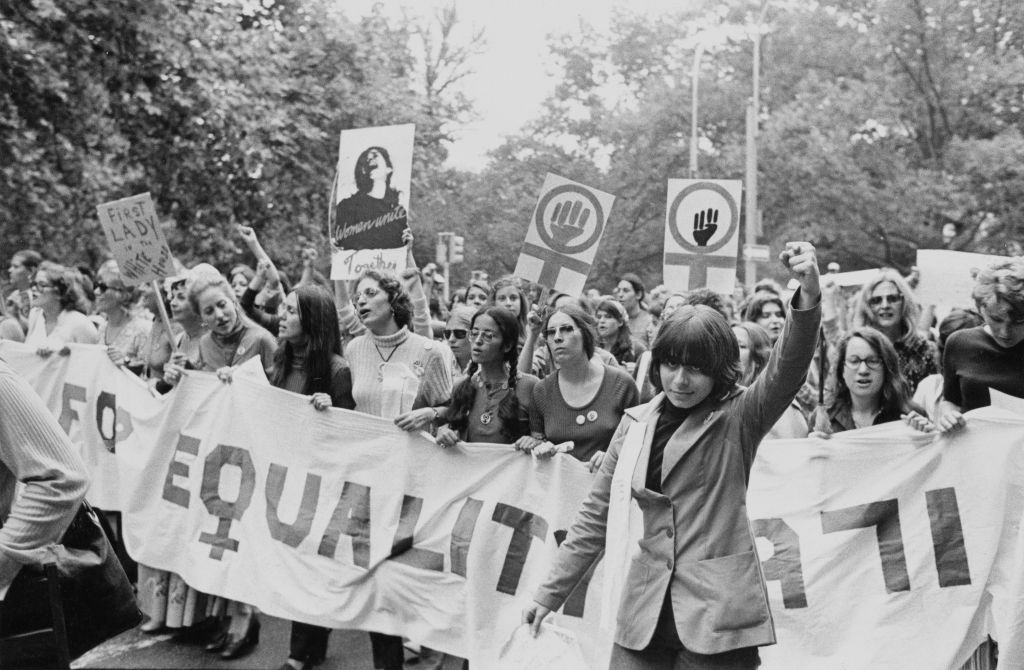Women's Rights & Issues
Showing Original Post only (View all)DEMOCRACY IS FEMINIST [View all]
DEMOCRACY IS FEMINIST
 ?quality=85&w=1024
?quality=85&w=1024
Women marching during the Women's Equality Day protest in New York City on August 26, 1971. It was designated as Women’s Equality Day by the U.S. Congress in 1973.
Peter L. Gould—Images Press/Archive Photos/Getty Images
Ideas
By Jennifer Weiss-Wolf
August 25, 2023 7:00 AM EDT
Weiss-Wolf is a contributor to 50 YEARS OF Ms. THE BEST OF THE PATHFINDING MAGAZINE THAT IGNITED A REVOLUTION out on Sept. 19, 2023. She serves as executive director of NYU Law’s Birnbaum Women’s Leadership Center
August 26, 2023 marks the 50th anniversary of Women’s Equality Day. Proposed in 1971 by Bella Abzug, the formidable feminist organizer and federal lawmaker from New York, and passed as a joint resolution by Congress in 1973, Women’s Equality Day recognizes the fight for women’s suffrage and hard won ratification of the 19th Amendment. Around the time Women’s Equality Day was first envisioned, Abzug joined forces with other leaders and activists—Gloria Steinem, Shirley Chisolm, and Fannie Lou Hamer among them—to form the National Women’s Political Caucus (NWPC). Through both endeavors they sought to acknowledge that political representation belongs at the center of the quest for gender justice—and, according to the NWPC archives, that “legal, economic, and social equity would come about only when women were equally represented among the nation’s political decision-makers.”
Historically, women in the United States have participated voraciously in civic life, registering and voting at higher rates than men in every presidential election since 1980. Black women show up at the polls and in voter mobilization efforts in even greater numbers, with turnout rates of upward of 66% in 2020. In July 1972, Steinem wrote for the newly launched Ms. magazine, “Black women come out stronger on just about every feminist issue, whether it is voting for a woman candidate, ending violence and militarism, or believing that women are just as rational as men and have more human values.” The same article by Steinem forecasted, “We’ve been delivering our votes [and] now women want something in return. Nineteen seventy-two is just the beginning …” And in many ways, it was. That year, the Equal Rights Amendment (ERA) handily passed the U.S. Senate and seemed destined for swift ratification. Chisolm’s public service—as the first Black Congresswoman, followed by her groundbreaking 1972 presidential campaign—altered the discourse about whether “White Male Only” remained a qualifier to lead the nation. And by January 1973, the Supreme Court decided Roe v. Wade, affirming a constitutional right to abortion.
Fast forward half a century, and Vice President Kamala Harris shattered the White House glass ceiling. Women’s overall leadership on Capitol Hill has continued to climb, reaching an all-time high in the 118th Congress—just over 28% (149 members). In the House, women broke records in the 2022 midterms, with 124 now serving, 27 of whom are Black and 18 are Latin. Women now comprise nearly a third of all legislators and elected executives, including a record 12 serving as governor. And still, the U.S. remains far from achieving fully representative governance compared to women’s actual population footprint; this is especially so for women of color. The U.S. pales in comparison to women’s political authority in much of the world, too, including among peer democracies.
. . . . .
Women’s Equality Day was initially a way to express the belief that, as noted in public policy scholars Zoe Marks and Erica Chenoweth's 2023 article in Ms., a democracy in which "half the population is subordinated—politically, socially, economically—is not a true democracy at all." 50 years later, we must be clear that women’s autonomy, well-being, and rights are inextricably tied to the integrity and durability of our democratic systems. As we look ahead, two states, Michigan and Minnesota, offer hope. Both have committed to reforms that increase voter participation, fair representation, and direct democracy; in turn, both have seen feminist priorities thrive, from codifying reproductive care and establishing green energy goals, to expanding paid family leave and protecting trans youth. As we trace the 50-year arc of Women’s Equality Day, among the lessons we might glean today: women’s voices and votes surely matter, transformative change is possible—**********and the fight for robust democracy is, at its core, a central and urgent feminist goal.*********
https://time.com/6307675/democracy-feminist-essay/